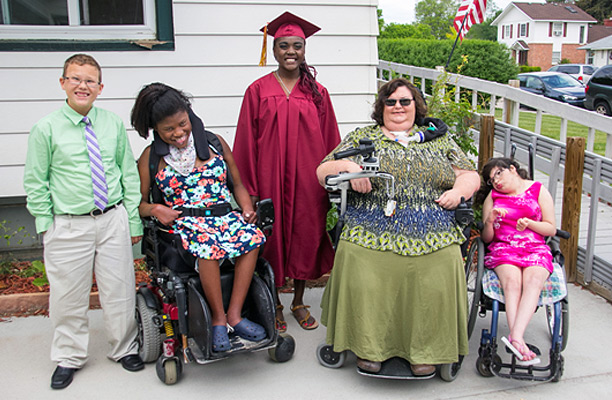
Born with mitochondrial myopathy, a form of muscular dystrophy, Carrie Ann Lucas uses a wheelchair and breathes with the assistance of a ventilator. She cannot hear; she can only see at close range.
And she has never let her disabilities stop her from pursuing her dreams—among them to be a lawyer and a parent.
Carrie adopted four children from foster care, including a daughter she found on the AdoptUSKids website. She shared her story and advice for potential parents with disabilities with us.
What compelled you to adopt your first child?
That’s easy. I was fighting for my family. My niece, Heather, was taken into the foster care system in Tennessee when she was 9 years old. She had suffered extreme neglect and trauma, and had severe physical and moderate intellectual disabilities. She was not going to be an easy child to find a home for. There was no way I was going to let her go.
What were the primary obstacles that you faced when adopting Heather?
Unfortunately, I encountered bias and flat-out opposition from Heather’s caseworker. She was determined that there was no way a woman with disabilities could care for a child with similar challenges. I credit Heather’s CASA (court-appointed special advocate) volunteer for convincing the judge that living with me was in Heather’s best interest.
The other challenge was my own lack of understanding of how the system works. Parents need to know how to advocate for themselves and access resources and information. It is overwhelming.
What do you tell parents with disabilities who are considering foster care or adoption?
It is possible, but it is not easy. And it is not always a good idea; not every person can be a parent.
As in so much of life, education is the key. Educate yourself about adaptive parenting aids — things like a baby bathtub that can be used by people in a wheelchair and “pip squeakers” baby shoes that help parents with little or no vision keep track of toddlers. I sleep with a sound-activated pager that vibrates when one of my daughters calls.
When representing yourself, be prepared to answer tough questions about your abilities, and know ahead of time how you will handle tasks that others may perceive as challenging.
Also, be aware of the resources and public benefits that are available to you. And then share your knowledge; educate the professionals you encounter in your effort to foster or adopt.
For example, many people are not aware of the attendant-care services Medicaid benefit that helps people with physical disabilities perform activities of daily living. Because I qualify for this benefit I have a part-time aide to assist me, and two of my daughters do as well. I could not meet some of the physical needs of my children without attendant care.
What do you think foster care and adoption professionals working with parents with disabilities need to know to better assess and support these families?
Again, a lot of it comes back to education.
I have seen far too many child welfare workers who are not aware of the adaptive parenting aids that can make parenting possible for people with disabilities. It is very difficult for case workers to take a strengths-based approach in assessing a potential with disabilities parent.
I like to tell the story of a mobility-impaired friend who was seeking to adopt a child who also used a wheelchair. The child’s case worker was very reluctant; she just could not envision how my friend could be a mother to this child. So we made a video of my oldest daughter with a younger child who is also in a wheelchair going through the daily tasks of life. Watching the video enabled that worker to see that yes, my friend could successfully navigate life with a child.
Why did you found the Center for the Rights of Parents with Disabilities?
Because I was tired of seeing other parents struggle to maintain custody of their children or to be taken seriously as foster or adoptive parents. Not every person can parent, but a lot of people with disabilities do not get the chance to parent due to a lack of experience or understanding on the part of child welfare workers and other decision-makers.
How does the center help parents?
We provide direct legal representation and technical assistance to attorneys representing parents with disabilities. We also provide information and referral services to parents with disabilities.
At the center we operate from the assumption that there are no perfect parents. We can always learn and improve our parenting skills. Part of being a good parent is knowing your rights as a parent, knowing your children’s rights, advocating for yourself, and advocating for your children.
What changes have you seen in the community of parents with disabilities in the last 20 years?
With the growth of the Web and prevalence of social media, our community has expanded! In my town I might be the only mom in a wheelchair who adopted children. But across the country I know and share information with dozens of disabled parents through a Facebook group of parents with disabilities. There are similar groups on Yahoo and Google+.
Any final words of advice?
Don’t give up! The first adoption is always the most difficult, no matter what the system. This is true regardless of disability. Don’t let the process discourage you, because it can work out.